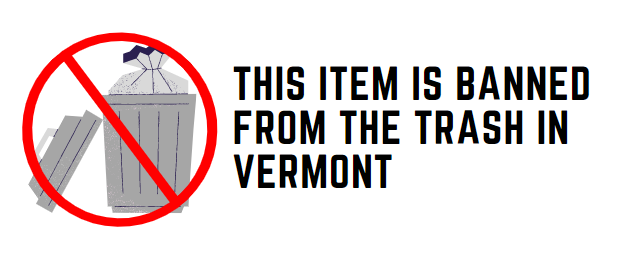Food Scraps & Food Waste
Vermont’s Universal Recycling Law (Act 148) bans all food from the landfill and your trash.
LRSWMD accepts food scraps at all of our drop-off sites, which we then turn into compost at Lamoille Soil.
See below for some other options for managing your food scraps. Diverting food scraps from the landfill not only means that you are complying with the law, but you are also making good use of the valuable, renewable resources that are embedded in food scraps.
-
Under Act 148, all trash and recycling pickup companies must offer food scrap service to their commercial customers and to all residential buildings with four or more units. Ask your pickup company, landlord, or homeowners association about food scrap pickup service.
Haulers do not have to offer food scrap services to individual residences; however, some do.See here for a list of licensed haulers operating in LRSWMD’s District towns.
-
Food scraps are accepted at all LRSWMD drop-off stations for $1 per 5-gallon bucket. See here for a list of materials we accept (hint: all food, including meat and bones!)
There may other local community composting sites or pod drop-offs available near you.
If you have room in your freezer, you can store your food scraps before bringing them to a drop-off site. Click here for other tips for dealing with food scraps.
-
Composting at home is a great way to make your own fertilizer! Click here to learn more about how it’s done.
-
Donating safe, edible food is the most preferred option for food that isn’t going to be eaten. See here for our list of local organizations that accept food donations.
-
Reach out to local farmers who may be interested in taking your food scraps for their chickens. Neighbors who raise chickens might be interested as well.
The VT Agency of Agriculture doesn’t currently have restrictions or guidelines for feeding food scraps to chickens, but there are strict regulations related to feeding scraps to pigs.
-
Food scraps and yard debris make up ~30% of a typical Vermont family’s waste; at restaurants and cafeterias, food scraps can be over half the waste.
Keeping these materials out of the landfill has a big impact:• When it is trapped in a landfill, food waste decomposes slowly, and without oxygen. This process produces methane, which is a greenhouse gas 84 times more powerful than CO2 over a 20-year period.
• Food scraps contain valuable nutrients that are good for the soil. Finished compost can be used in gardens, farms, and landscaping and to improve soil health.
• Generating less trash conserves landfill space. There is currently ONE operating landfill in Vermont.
• Composting puts your waste to work supporting composters, local farmers, and food scrap haulers.
• According to the book Drawdown, food that is produced but not eaten contributes 8% of the world's total greenhouse gas emissions, and reducing food waste is one of the single most impactful actions for reducing the effects of climate change. Composting food scraps is also an important climate solution.
Adapted from VT Department of Environmental Conservation
-
Check out our list of licensed haulers in the District. Not all of them offer residential food scrap pick-up, but many of them do.
Food scraps can be dropped off at any operating transfer station in the District, including LRSWMD’s 5 drop-off sites (Craftsbury, Johnson, Morrisville, Stowe, and Worcester); the Wolcott Transfer Station; Casella Cambridge; Casella Hyde Park; and All Metals Recycling in Hardwick.
-
Unfortunately, many items sold under the term “compostable” do not actually break down in the composting process. Many are made of plastic. It is impossible to tell just by looking at it whether an item is truly compostable or a fake. Therefore, we do not accept “compostable” serveware at our drop-off sites, and neither do many other compost operators.
If you want to line your food scrap bucket, please use a paper bag (if you are bringing your scraps to us). If you’re taking them somewhere else or have a hauler, check with them for their recommendations and what they accept.
The most environmentally friendly option is to use reusable serveware.
-
If you’re composting in your backyard, best practice is keep meat and bones out of your pile or container. Doing so will keep odors down and wildlife at bay. You still have several options for meat and bones:
• Use a green cone digester
• Drop off meat scraps at a local transfer station (like one of ours!) or commercial composting facility.
• Bury bones in your garden by digging 18” -2’ deep and covering with soil.
• Add to trash (Act 148 does not ban meat scraps from the landfill for home composters; it does for businesses).
